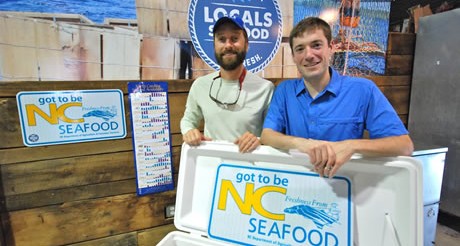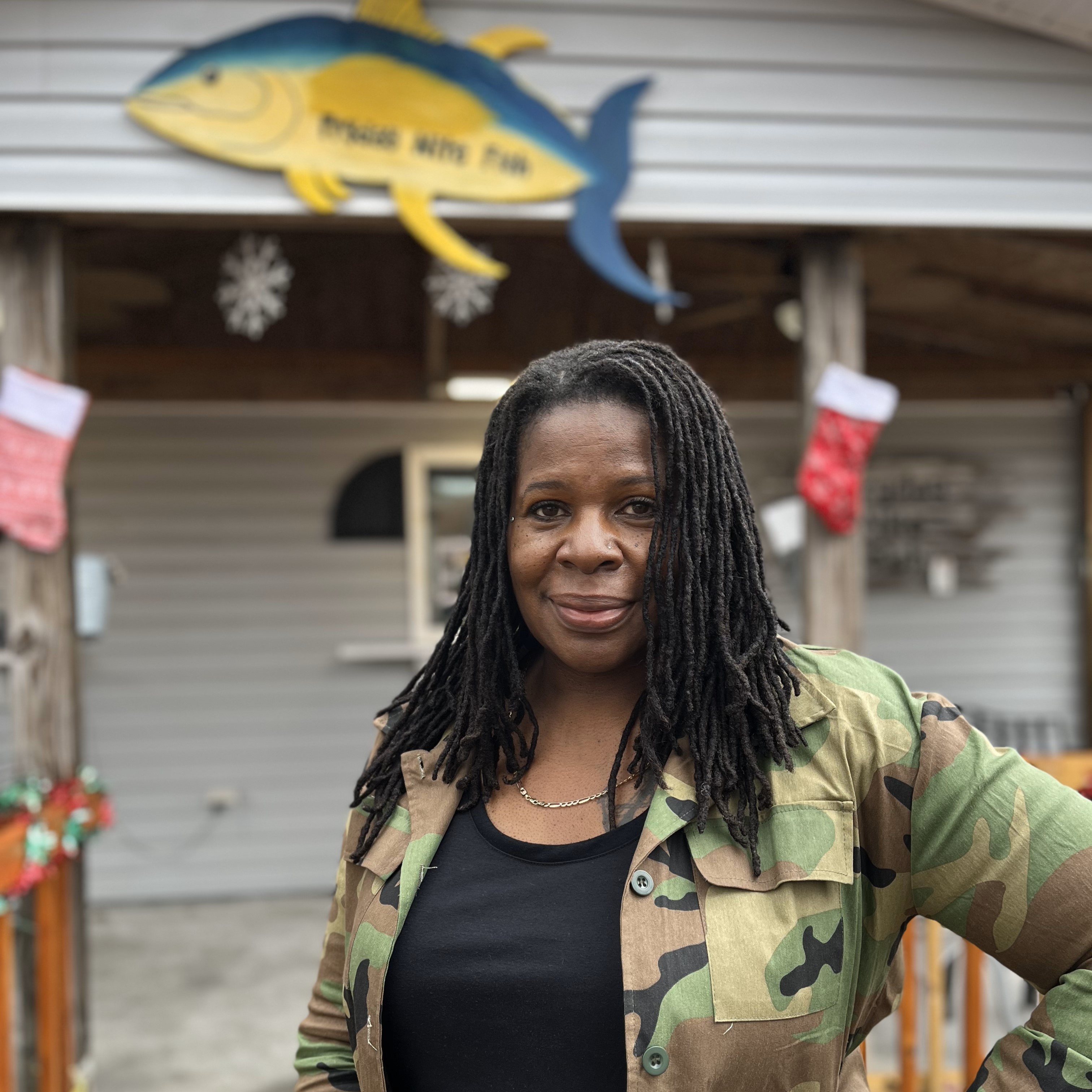Locals Seafood Delivers Fresh Fish Direct From The Coast

By Elizabeth Wiegand
Edible Piedmont (Spring 2014)
Even if seafood found in our local markets is advertised as being from North Carolina waters, it may have gone on a long, circuitous road trip. Most of our state’s seafood is sold to markets in New York City and Boston, big food corporations that process and package it. Then it’s reloaded back onto a truck, with some returning to North Carolina restaurants and groceries.
That long road trip negates the whole idea of eating local, and that’s the beauty and logic of Locals Seafood, which connects the dots on the map directly between the docks and our tables.
Locals Seafood started out as two guys and a truck, selling coolers full of day boat shrimp on the side of Six Forks Road in Raleigh, back in 2010. Now, it’s almost a million dollar business.
The vision of two North Carolina State University college buddies, Ryan Speckman and Lin Petersen, both wildlife biology majors, was to find a better way of getting local seafood to the Triangle, and create a business. Fortunately for them, the concept of local happened big time.
“We’re just riding that wave,” says Speckman, whose former job was dealing with endangered species around Columbia, NC, where he made friends with commercial fishermen. Now, it’s his job to procure the freshest stuff he can find up and down the coast. His business partner, Petersen, worked with Great Outdoor Provisioning and was a guitarist with a Raleigh band. He’s a natural at marketing and relishes talking with chefs, so he handles the wholesale end.
They started with the money in their pockets, relied on their wives’ incomes, and did not take a salary for two long and lean years, reinvesting any profits for used refrigeration equipment and the like.
Today, Locals Seafood trucks in whatever is in season. A huge variety of fish, crabs, and shellfish offered by the two opposing ocean currents off the North Carolina coast – the warm, tropical waters of the Gulf Stream, which collides with the cold Labrador current just off Cape Hatteras, and a difference in timing of catch from the Outer Banks and Carteret counties, a couple hundred miles away.
A majority of Locals Seafood’s customers are restaurants; Lantern in Chapel Hill, Saltbox Seafood in Durham, Raleigh’s Poole’s Diner, Mandolin, and NOFO, or Oakleaf in Pittsboro.
“The first time Lin delivered tuna to us, and he was willing to eat the raw slice I cut off the fish, I knew they’d be people who care as much about quality as we do,” says Brendan Cox, chef/owner at Oakleaf. “There is an ‘immediacy’ in the flavor of Locals’ products that is a result of their dedication to quality and regional sourcing.”
That same seafood is also sold at their retail market stall in the upper building at the State Farmers Market in Raleigh, and at several seasonal farmers markets in the Triangle (see sidebar).
Weekly or bi-weekly shares, along the lines of a CSF (community-supported fishery), can be picked up at the markets. Shares include two pounds of two different species, whatever the fresh catches are, sold at wholesale prices. Sometimes that means yellowfin tuna and grouper, two high quality fish at a super price; other times it is fish that home cooks may not be as familiar with, such as sheepshead or tilefish. With lesser-known fish, recipes are linked to their website.
Locals Seafood also tries to identify the name of the fisherman who caught the fish, the oyster farmer to the readied bushel, or the guy or gal who hauled in the crab pots. “We want to give fishermen credit, too, and let our customers have an emotional attachment to them,” says Speckman.
Wanchese, one of the very oldest fishing communities on the Outer Banks, is still the main portal for much of North Carolina’s seafood. During buying trips to the coast, Speckman inspects the fish as it’s loaded off the boat onto the docks there. “We’re putting our eyes on it ourselves,” he says, to make sure it meets their freshness standards.
Back in Raleigh, it’s all moved within 48 hours. . If fillets are what the chefs’ want, they’ll cut the fish the night before it’s delivered. “A whole fish holds reasonably well, but as soon as air intersects with the flesh, it starts degrading.” When asked how good he is now at cleaning fish, he laughs. “I’m a proficient cutter,” along with three employees.
“We sell all local seafood. That’s what makes us different. Our product was swimming the day before. Nobody else can claim that,” says Speckman. “North Carolina has a long heritage of fishing, and it’s time for the fish to come our way.”





